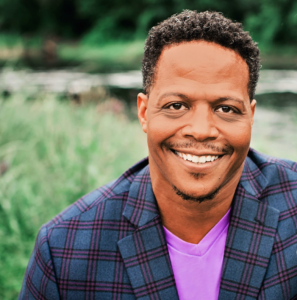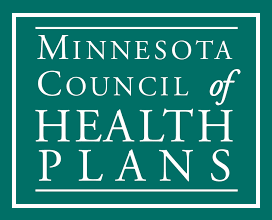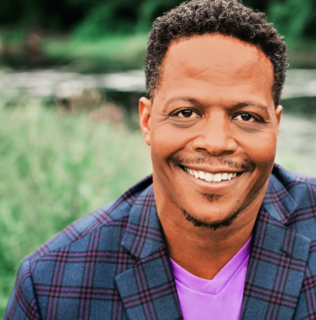
Bukata Hayes
Bukata Hayes, Vice President of Racial & Health Equity for Blue Cross and Blue Shield of Minnesota, has spent two decades advocating for racial and social justice. His role at Blue Cross was specifically created to serve as an advisor and partner, helping leaders identify and execute initiatives to effect lasting change and apply a racial and health equity lens to every aspect of the organization. The Council recently caught up with Bukata to get his thoughts on the health equity journey at Blue Cross.
———
QUESTION: How long have you been with your organization and what’s been your journey to your role?
ANSWER: I joined Blue Cross and Blue Shield of Minnesota as Vice President of Racial & Health Equity at the end of March. My work with diversity, equity and inclusion has spanned 20 years in systems large and small, including the nonprofit sector, K-12 schools, higher education and rural communities. And while I just recently reached the official 90-day milestone at Blue Cross at end of June, I’m no stranger to the organization as I’ve been active with the board of directors for the Blue Cross and Blue Shield of Minnesota Foundation since 2014.
My parents have had a tremendous influence on my journey. My father was a pro-Black civil rights activist with a strong commitment and connection to community. And my mother modeled endless strength and persistence, even on the loneliest of roads. My mom was the only black woman in her classes to become a respiratory specialist. My parents believed in leading with humanity. And throughout my career, I’ve often been drawn to organizations and initiatives in their infancy and advocating for causes long before it was trendy to be having those conversations.
Before coming to Blue Cross, I served as the executive director of the Greater Mankato Diversity Council since September 2006. Before that, I served as the coordinator of the Multi-Ethnic Center at Bethany Lutheran College in Mankato, the first-ever position of its kind at the college. I’m also involved in numerous community and civic organizations, including the Mankato Chapter of the NAACP (executive committee); the Martin Luther King Jr. Commemorative Board, Mankato (president); the Steering Committee for Police Reform, Mankato; Mayo Clinic, Mankato Hospital Board; and the Blandin Foundation Board of Trustees.
Q: Disparities in health care have always existed, but in your view, how have recent events – like the COVID-19 pandemic and the murder of George Floyd – impacted health equity work and where it is headed?
A: We can no longer not center race in health equity work. Historical exclusion based on race has woven complex, systemic problems that can only be effectively addressed by looking through that same lens. COVID-19 laid bare the consequences of persistent inequities.
George Floyd’s murder, death by asphyxiation due to a knee on the neck, was in many ways the physical manifestation of the figurative existence of Black and Brown folks in this state, making it clearer than ever that we need to address and uproot what we have allowed to happen in our society. We must continue to acknowledge the historical roots of such tragedies and commit to undoing the residuals of systemic racism within our organizations, institutions and communities. And not just within policing, but in every corner of American life from health care to housing to income and more.
Responding to the symptoms hasn’t solved anything. The ground is fertile to focus on upstream issues and true systems change. As part of our overall business strategy, Blue Cross has made racial and health equity a blue chip, creating an enterprise-wide Racial and Health Equity Plan.
The plan’s central tenants are to:
- Create a diverse and inclusive workplace through representation and leadership.
- Reduce health inequities for people of color in the state of Minnesota.
- Remove barriers to health for Black, Indigenous, Latinx, Asian Pacific Islander and other communities of color through community partnerships.
- Foster deeper connections with our existing provider value-based partnerships and to accelerate health equity partnerships along with a value-based payment model to address clinical areas most impacted by racial disparities.
- Work to reduce barriers to care for our Medicaid members by increasing access to immunizations and well-care visits, improving maternal health, eliminating barriers to transportation, and increasing access to mental health care and dental services.
- We also became the first Minnesota health plan to create a gender services consultant position, committed to supporting inclusive and equitable care and service to transgender and non-binary members.
Q: What are some of the biggest barriers you see in delivering equitable care and what are steps that health plans can take to better connect with BIPOC communities?
A: The growing linguistic and cultural divide is perhaps the most visible barrier in health care. We need to embed language access in a way that helps people navigate the complexities of health care.
Core to the larger problem is our lack of understanding of both the historical roots of inequities as well as the full range of complicit behaviors that have allowed inequities to persist. We can’t change what we don’t confront or don’t fully understand. Health plans need to connect and partner with BIPOC communities, engaging in the gray area even when it’s uncomfortable and the path forward is uncertain. It’s vital that we approach these conversations with the full humility that we alone don’t have the answers.
Q: What specific initiatives (committees, taskforces, work groups, cabinets, etc.) have been created at your organization to address health equity? And given these initiatives, what progress has been made in terms of making care more equitable?
A: A central component of Blue Cross’ antiracism pledge was to listen to and learn from Black, Indigenous and communities of color (BIPOC communities) about how racism impacts health outcomes, what Blue Cross can do dismantle systemic racism and how the organization can work in solidarity with BIPOC communities to create a healthier and more equitable future.
Working Marnita’s Table to conduct a listening tour this past year has been powerful. Marnita’s table is a Twin Cities nonprofit dedicated to closing gaps across differences by amplifying the voices of BIPOC communities, the economically disadvantaged, LGBTQ+ and others left unheard in policy and community decision making. In total, we connected with 150 community members and what we learned helped us identify priorities so we can make changes where it is most needed.
Based on the feedback participants provided, six key priorities for Blue Cross to consider emerged:
- Actively work to build trust. Acknowledge and respond to historic and ongoing disparities in care and access to care.
- Address stigmas in health care related to race, citizenship, mental health and body weight. Provide more support for whole-person care.
- Prioritize affordability and accessibility of care. Develop user-friendly platforms for navigating insurance.
- Provide coverage for holistic and culturally appropriate care. Increase provider options and diversity of representation.
- Increase translation services in health care. Interpreters and multilingual information are critical to health equity.
- Provide technical support and computer literacy training for elders and others needing access to telemedicine services.
We have also taken a stand against systematic discrimination in our health care system on behalf of our transgender and non-binary members. Since 2016, Blue Cross has dedicated significant resources to establishing a new standard for excellence in transgender care and service. We refined our benefit and policy communications to ensure they offered clear guidance on gender-affirming services available to our members. We made our written and spoken language to members more inclusive, meaningful and respectful of the LGBTQ community.
Blue Cross also created the role of gender services consultant to provide personalized, affirming guidance to our transgender and non-binary members and their families, helping them navigate care and coverage questions, connecting them to health plan benefits and helping them find the right doctor.
Q: What role do you see partnerships (with the community, with the state, with others in the health care ecosystem, etc.) playing in advancing health equity efforts?
A: The community has the answers. The only way forward is to share power and partner. Being part of the solution requires a humble posture cognizant of how we contributed to the problem and then lifting up the solutions identified. Because of the sheer number of Blue Cross members in our state, we can often play the role of a convener, drawing organizations to the table where we can make progress together.
Q: What role does organizational culture and diverse staffing play in health equity?
A: Who we are as an employer is directly connected to our ability to impact health equity more broadly. Working to get it right on the inside allows us to show up genuinely with our stakeholders, opening the door to mentor or be mentored since we’re on this journey together. My role was specifically created at Blue Cross to serve as an advisor, bridge builder, strategic leader and partner, supporting leaders across the organization to identify and execute initiatives to effect lasting change and apply a racial and health equity lens to every aspect of the organization.
Q: Distrust in the health care system continues to be a huge challenge when it comes to health equity, which has been laid bare by lower COVID vaccination rates in communities of color, but impacts other care, also. How do we rebuild trust in BIPOC communities?
A: The roots of health care system distrust are deep, emanating from the history of medical malpractice against Black and Brown people in this country. From experimentation on enslaved women without anesthesia, to more than 3,000 American Indian women being involuntarily sterilized by the Indian Health Service, all the way to Henrietta Lacks whose cells have enabled more than 70 years of medical research and advancements even though those cells were cultivated without her consent.
Resolving centuries of distrust takes time, transparency, and consistency. However, such distrust is not solely down to historical trauma. Our ongoing contemporary issues with systemic racism, discrimination and unequal access to quality health care actually threatens to be the bigger barrier to overcome for many BIPOC communities as that is their lived experience. That is why it is crucial we build relationships and are transparent and accountable to the communities, sharing resources, power, and building our own cultural competencies to be better advocates and providers of health. And this has to be the norm, not just when there is a global pandemic, and vaccine to distribute.

